The Voyage
There is a tide in the affairs of men.
Which, taken at the flood, leads on to fortune;
Omitted, all the voyage of their life
Is bound in shallows and in miseries.
On such a full sea are we now afloat,
And we must take the current when it serves,
Or lose our ventures.Shakespeare
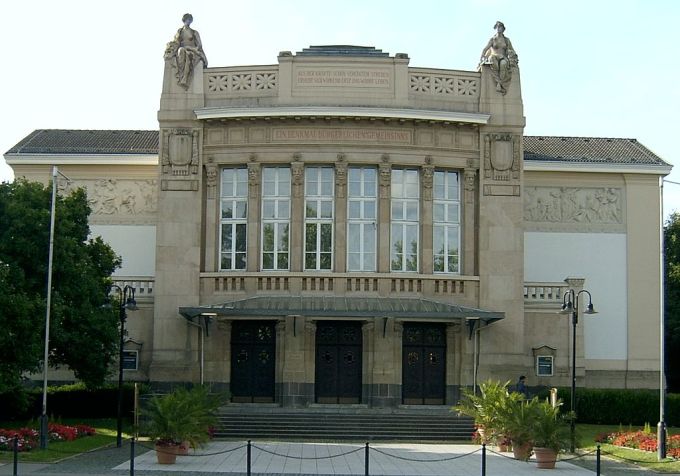
Theatre in Giessen – Photo Credit: wikipedia.org
Travel Preparations and a Farewell Speech on a Vinyl Record
The day after Biene had returned home, Adolf took my sister Eka and me on a whirlwind tour to Berlin, where we saw for the last time Aunt Alma and her family. On the way back we dropped in at the apartment of our brother Karl in Braunschweig, where he had recently embarked on a banking career at a local bank. There in the beautiful apartment we spent a few days with our brother, his wife Ingrid and their little baby daughter Annekatrin.
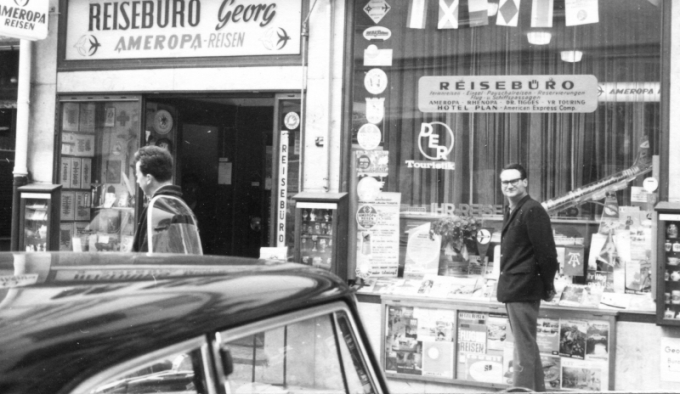
Adolf Standing in front of the Giessen Travel Agency
Back at home we directed our attention to the task of getting our belongings packed and ready. Our tickets for the voyage to Canada included the shipping charges for the wooden crates that contained all our personal effects. Almost too late we found out that we were responsible for moving them to the travel agency in Giessen. Almost instantly arose a heated argument among the hot-tempered siblings, myself included, as to whose fault it was for having overlooked such an obvious problem. Accusations were flying back and forth. It seemed that each one of us was on a faultfinding mission. Of course, no matter how hotly we debated the issue, the heat of the arguments would not move our big, heavy crates to Giessen.
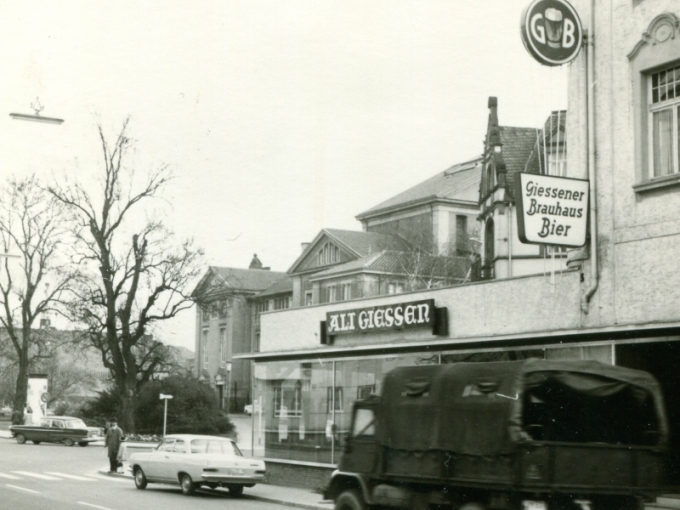
Problems Worked out over a Mug of Beer
Fortunately our cousin Jürgen arrived just at the right time and helped diffuse a potentially explosive situation. He suggested a cooling-off period for the enraged brothers. In Giessen we dropped in at the ‘Vienna Forest, a popular restaurant, where they served us grilled chicken and beer. Tension and lingering hostility abated quickly at the same rate as our stomachs filled with delicious food and copious amounts of beer. Now we were ready to tackle the shipping in a more amiable environment. Jürgen had just made the acquaintance of a fellow student, who would be willing to provide his old and dilapidated VW bus for the crates. After a few more drinks at a roadside fast food outlet we were going to announce the good news at home. However, the pub, ‘The New Homeland’, was still open in Watzenborn. We thought a few more beers would not hurt and would definitely clear away the last little bit of rancour, before going home. So we finally arrived in a fairly boisterous mood. Everybody had already gone to bed. But this did not prevent us from loudly announcing to Eka that we had found a solution to the shipping problem. We all withdrew into the furnace room, which with its excellent sound-proofed walls offered a modicum of protection against the noise. Befuddled by all that beer I played the guitar rather poorly often missing the correct fret, while Adolf sang the song merrily out of tune with the chords I was playing. In the meantime Jürgen and Eka had an animated discussion on the poor timing of our nocturnal arrival. Not receiving the appreciative reception that we were expecting, we decided to spend the night at Jürgen’s place in Giessen and slept for want of something more accommodating all three in one bed, but not before having a taste from the bottle of whiskey that happened to be there for this crazy occasion. Next morning (or was it noon?) Adolf and I, feeling somewhat remorseful for our rambunctious behaviour the night before, drove home quite willing to accept any criticism with a repentant heart and to make amends by getting the crates ready for shipment.
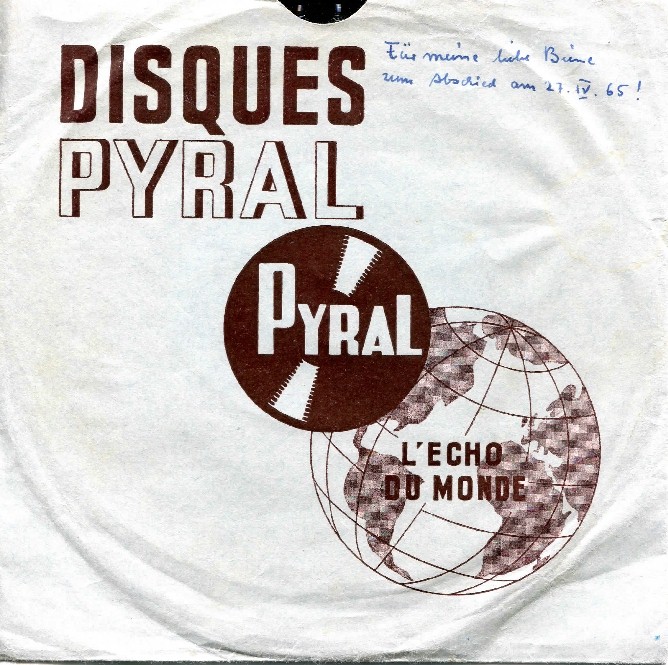
In the turmoil of the endless visits of well-meaning relatives and friends, who all came to say good-bye, I still managed to keep up the correspondence with Biene, although it was almost impossible to find a quiet corner in the house. I had made a recording of a few simple classical guitar pieces that I felt were good enough for her to listen to. In addition, I recorded a farewell message on tape and mailed it together with the music to a company in France to have it pressed onto a vinyl record. A few days before our departure date the record arrived, which I embellished with some pretty labels and redirected it to Biene’s home address. It so happened that on the very day we boarded the Canada bound vessel, the ‘Ryndam’, she received my gift.
The recording sounds a bit scratchy. But what do you expect from a 50-year old vinyl record?
Farewell to Germany
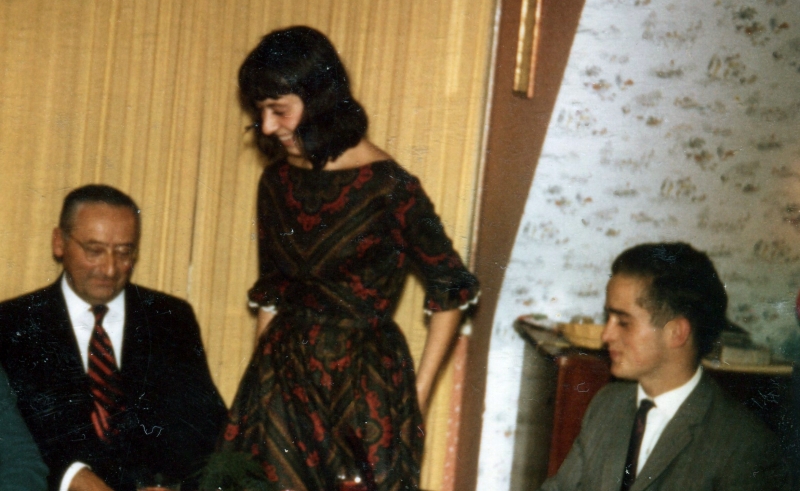
Papa Panknin with Daughter Biene and Son Walter 1965
Career planning for his daughter was on Papa Panknin’s mind, when he asked Biene to have a serious talk with him. He was not fond of seeing her becoming a teacher. He felt that it would be too stressful for her. Sitting endless hours in lecture rooms, bending over and studying textbooks would lead to even getting more stressed out, when after her university training Biene would enter again the educational treadmill. In his opinion the best thing for her to do would be to get a job and earn money as quickly as possible. Being a little tightfisted and in control of the family purse strings, he may also have been thinking of the expenses, which a prolonged period of university training for his daughter would incur. In contrast to North American practice German law required that parents were at least in part financially responsible for their children’s post-secondary education. In addition, there was probably on his mind his son Walter, Biene’s twin brother, who was embarking on a six-year program at the Institute of Engineering at the University of Hanover. Biene, with her eyes firmly set on getting married, agreed to a compromise that her father had proposed. She would start immediately her teacher’s training at the university of Wuppertal, but at the same time apply at the German airline Lufthansa to enter a training program to become a stewardess at the age of twenty-one. In my eyes this was a good plan. I really wanted her to become a teacher. So I took comfort in the fact that thousands of young girls were dreaming about becoming a stewardess and only a few had their applications accepted every year. Therefore, I had no difficulty of sending my wholehearted approval and let Biene romanticize about working for Lufthansa and flying to Calgary, where she could visit me on her stopover flights to Western Canada.
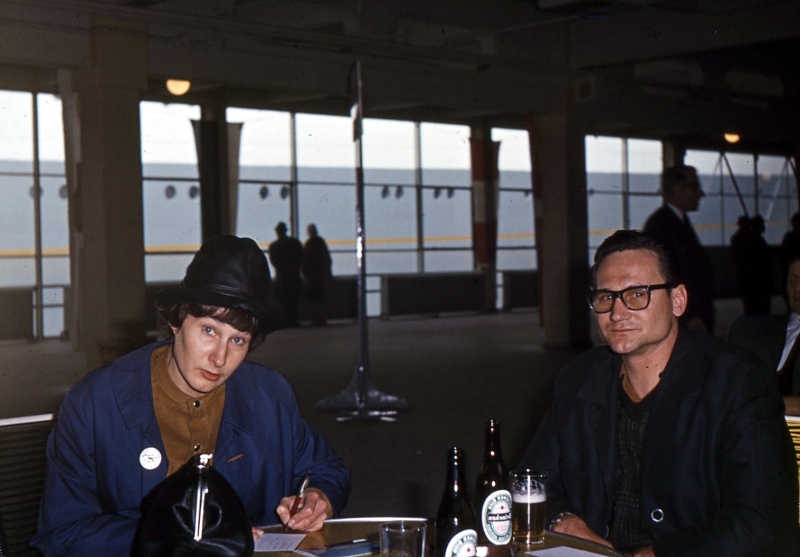
Adolf and Eka in the Waiting Room at the Rotterdam Terminal Station
At last, the day arrived when Adolf, Eka and I were on our way to Rotterdam, where we would board the passenger ship Ryndam that was to carry us to Canada. Mother woke us at 3 a.m. to make sure we would have ample time to enjoy a solid breakfast before we parted. One hour later we sat at the breakfast table. Aunt Mieze read from her devotional booklet and included us in her morning prayers, with which she had been greeting the day for as long as I can remember. The outside world was still shrouded in darkness, which put us all into a somber mood. The thought that we would not be seeing Mother and all the other dear relatives for a very long time was weighing heavily on our mind. Later on, we were occupied loading Jürgen’s car with our possessions, five suitcases, my tape recorder, guitar and a gigantic duffel bag with personal belongings too valuable to be trusted to the wooden crates. The heavy work made us forget a little the pain of leaving home. We even managed to put on a cheerful face, when we said our good-byes adding comforting words like ‘We’ll meet again in beautiful Canada!’
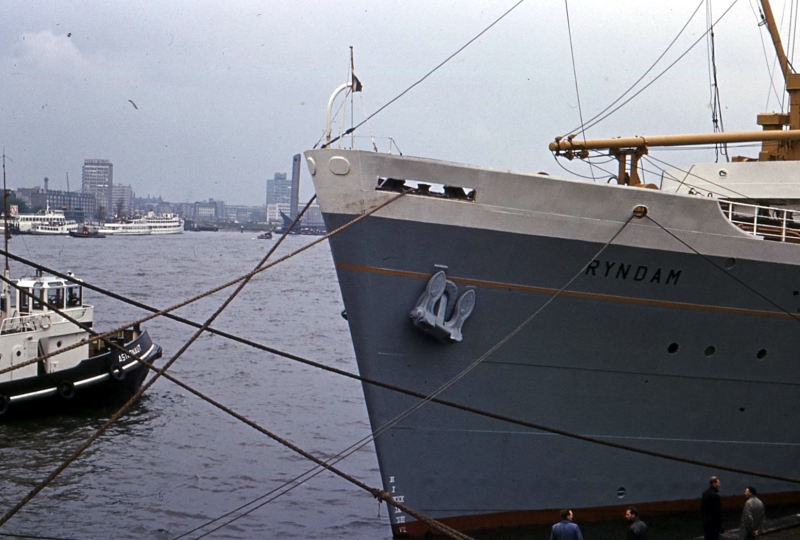
The Ryndam that brought us to Canada – Anchored at Rotterdam Harbour
The Trans European Express train (TEE) was racing at an incredible speed towards the Dutch border stopping only at major urban centres. At Wesel, my previous hometown, which had grown into a city of almost 50,000, the train did not stop either. Shortly after noon we arrived in Rotterdam, where a taxi took us to the harbour, which was and still is one of the biggest and busiest ports in the world. There our ship was waiting for her passengers to come on board. In the harbour inn Adolf and I sat and drank beer, while Eka had a coffee to perk up with after such a long train ride. We were quite annoyed at the delay of our departure caused by the much larger sister vessel of the Holland-America line bound for New York, which happened to leave port on the same day. Finally we were allowed to embark. Before heading out into the Atlantic Ocean, the Ryndam, for the next ten days our home, hotel, restaurant, and entertainment centre, had to make two ports of call, Le Havre and Southampton. From England I mailed Biene my first letter written at sea.
Two Letters and a Poem
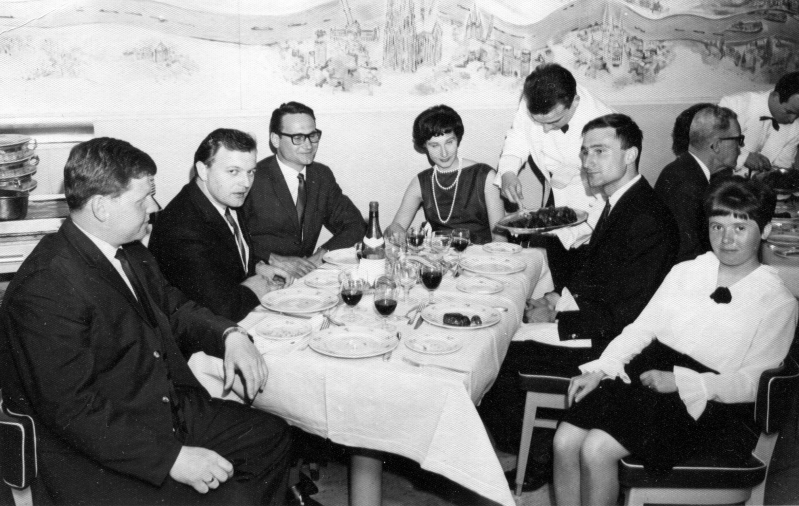
Meal Time on the Ryndam – Adolf, Eka and Peter at the Back
April 28th, 1965 Le Havre
My dear Biene,
We just left Le Havre and are heading towards England. Thousands of impressions hit me all at once. I feel as if I had already been on board for a very long time. It is like paradise. Yet, I am restless, because you cannot experience all this with me. I’d like describe to you how a typical day is panning out for us travelers. The tinkling of bells wakes us up in the morning. It is also reminds us in this gentle way to show up for breakfast soon. Then I climb down the ladder. For I sleep in the upper bunk, while Adolf sleeps below. We can shower or take a bath for as long as we like. Then we march off to the dining room. Never before have I seen a greater variety of food. When we return to our cabin, the steward has already made our beds. The cabin is very small, and if one had to share it with a stranger, that would definitely not be a pleasant experience. We all have our own peculiar habits, which someone else would have to get used to.
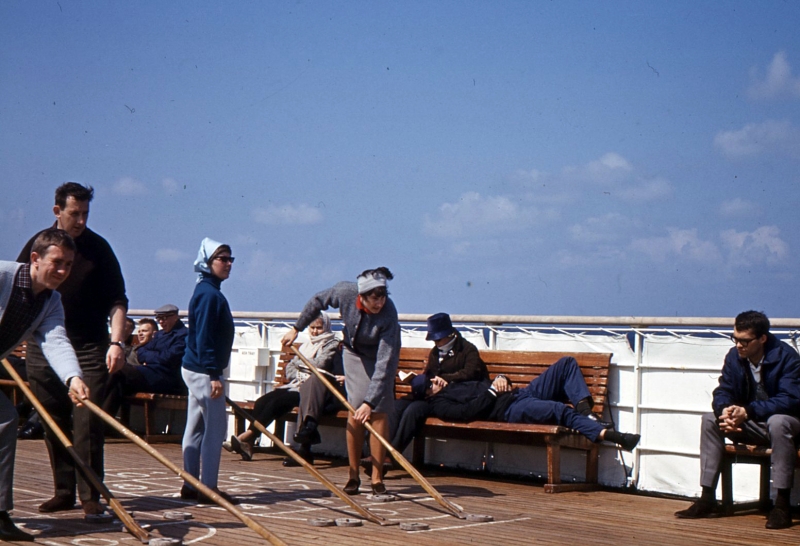
Shuffle Board on the Sun Bathed Deck
The entertainment program is so rich and varied that one does not know which item to choose first. You can watch English movies, go to the library, play all kinds of games. The big hit here is Shuffleboard. After lunch you can attend a concert, go dancing in the evening or have a beer in the bar. And now I experience all this without you! That makes me a little sad and pensive. When I turn melancholic, I gladly withdraw from all these fun activities and write in my travelogue.
Oh this heavenly weather! People are presently sun bathing and there is no rough sea, not even a trace of a swell. I wanted to experience a real storm. But my brother said that it would come soon enough, if I were really that keen on getting seasick.
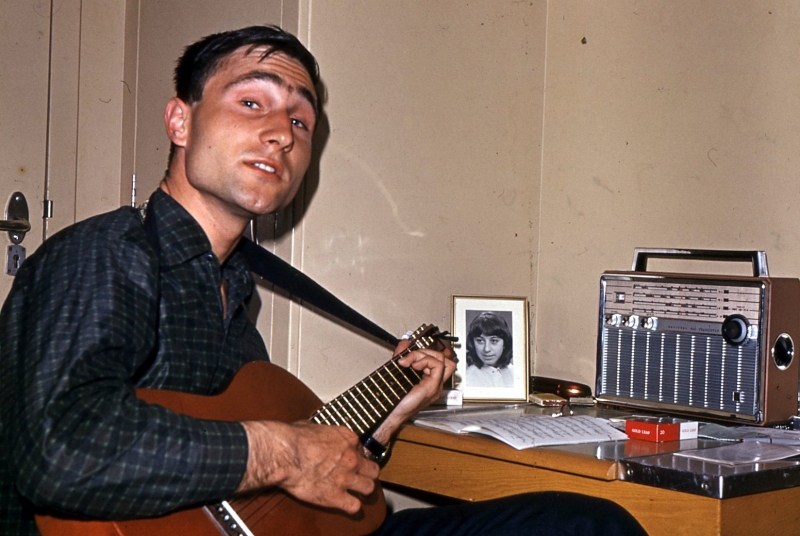
Peter Strumming on his Guitar
Your picture stands on my little desk. When at night I look down to you from my bed, I feel infinitely happy. I wished I could do the voyage all over again with you, when I have enough money to pick you up in Germany.
In a few days you will begin your studies, whereas I while away the time here doing nothing. Tackle your academic work as if you never applied for the stewardess program and as if you pursued a life’s career. You should know that you can help me also as a trained teacher, perhaps later assist me for a little while, in case my own studies should be dragging on.
What would I give to be able to kiss you now! Until next time greetings to you and your parents!
Your Peter
On the same day Biene also wrote me a letter, which of course I was unable to read, until I arrived at my brother’s place in Calgary. I only included excerpts here to avoid breaking the chronological order of the family history.
April 28th, 1965 Velbert
My dear Peter,
Again you have made me cry. But don’t you worry, Peter. I did not have to cry out of sorrow (it was only lingering at the back of my mind), but from an overwhelming feeling of joy, happiness and unfathomable love. I listened to your guitar music and to your voice on the record you had sent me. I could not grasp it! I just sat there, and tears were streaming down my cheeks. I once read that only a few people really understand how to say good-bye, and you knew how, Peter. Never will I forget this!
Dear Peter, now you have been on board for one day and with every minute you are getting closer to your destination. And when you read this letter, the long sea voyage and the road trip across Canada will already be behind you. Tell me Peter, isn’t it an incomprehensible feeling to be on the high seas and to experience the vastness and beauty of the ocean? When I experienced the sea for the first time, I was deeply moved. It was in the year we had met. My family and I were spending our vacation on the island of Corsica. Toward evening we had landed on the island. It was night, when we reached after an adventurous trip through the mountains our vacation village at the sea. Completely exhausted we immediately fell into a deep sleep, from which I awoke unusually early in the morning. In eager anticipation to finally cast my eyes onto the sea, I quietly sneaked out, because my brother Walter was still fast asleep. Outside the air was cool and still. The sun had just risen above the horizon. The beach spread before me still completely untouched. I went a few steps down the slope and then I took in the full view of the sea! Somehow I was like in trance and could not move another step forward. Although the view was overwhelmingly beautiful, the infinite vastness also instilled in me a little bit of fear. I sat down very quietly in the sand and remained there, until the first beach guests, who frolicked in the water, broke the charm that had kept me spellbound. You alone, dear Peter, would not have dispelled the magic atmosphere.
Inspired by her memories Biene wrote the following poem and entered it into the Book of Dreams.
The Sea
I will forever love the sea,
Even when the gulls scream
Above thousands of storm-tossed waves.
I love the play of colors in the surf,
The billowing clouds, the sun, the warm sand, …
Oh Peter!
How much would I like to sit with you
On a lonely beach, at the sea
With its music
Rather than being
Separated from you
So infinitely far away
On the other side of the ocean.
On board of the Ryndam I also romanticized the sea as if in response of her letter that I had not even read yet.
Gale Force 7 in the North Atlantic
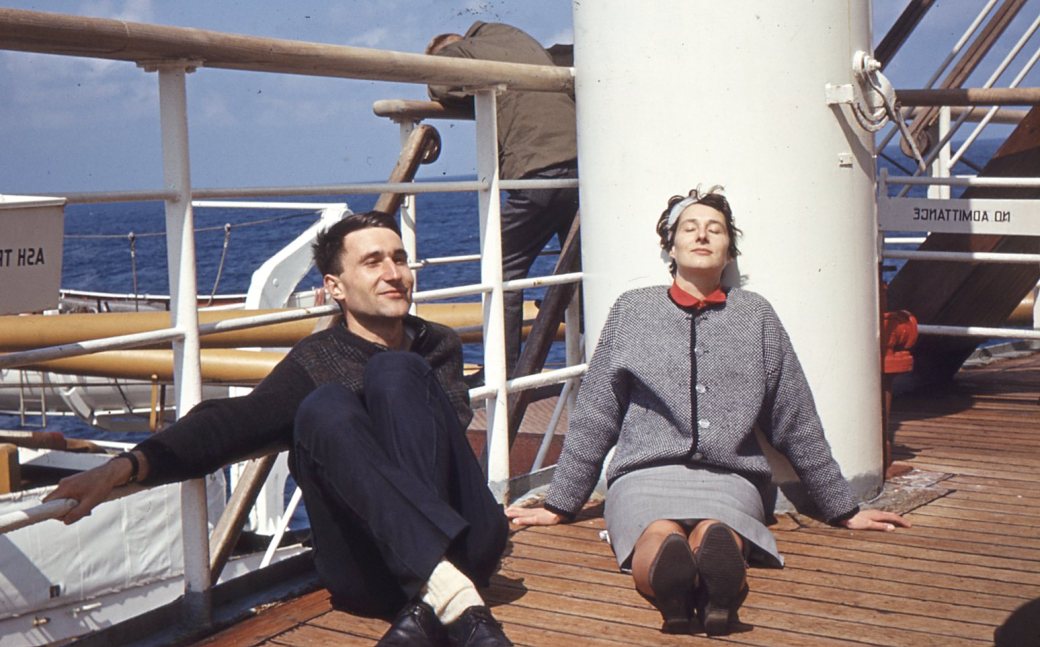
The calm sea and the sunshine are deceiving (my sister and I relaxing on deck of the Ryndam)
After a few days of calm and sunny weather a violent storm broke out, which put an end to the leisurely lounging on deck and made most passengers withdraw into their cabins. I entered into my travelogue:
“ Today is an especially stormy day. Most passengers don’t dare to come on deck. They play cards instead or while away the long hours in some other way. But outside awaits the intrepid traveler an indescribable experience. I believe, if you fellow travelers were not afraid of becoming seasick, you would, like my brother and I, be eager to see what a storm Poseidon can whip up for you. At the stern of the ship we view how one of the most awesome spectacles are playing out in front of our eyes. Presently we have wind force 7 on the Beaufort scale, and the waves are piling up high threatening to engulf the Ryndam. In the dark all this takes on an all the more eerie appearance. The waves are bedecked with white foam. And it seethes and hisses like in a witch’s cauldron. When the crests reach a certain height, they seem to lose by the sheer wind force their support and dissolve into sheets of spray, which drift like blowing snow up against us. Feeling the mighty wind and tasting salt in our mouth, we are invigorated in body and soul. A great sea voyage turns into an inner experience.”
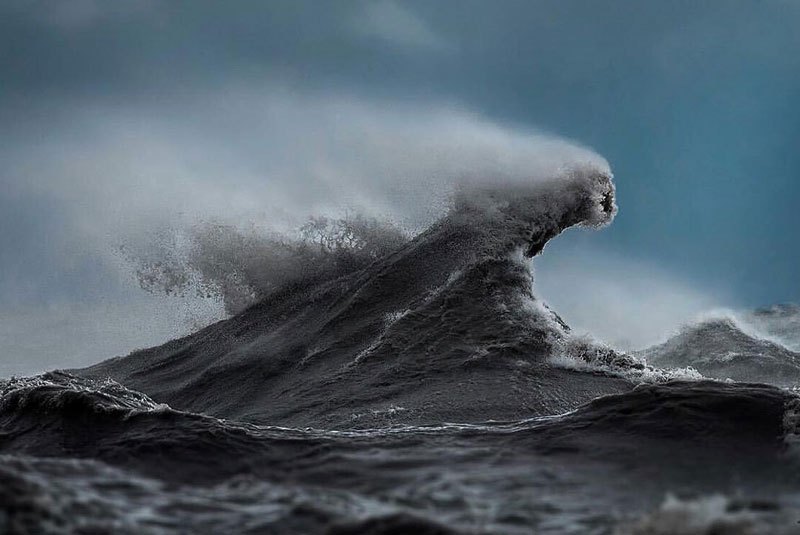
Giant Wave – Photo Credit: zaujimavysvet.sk
World literature is replete with fascinating stories dealing with violent storms at sea. Confronted with the raw unbridled forces of Mother Nature man seems so small, so weak and insignificant. In the early days of exploration sailing ships were being tossed about like little nutshells by mountainous waves and hurricane-force strong winds. In ballads, short stories and novels the authors extol the indomitable human spirit that pushed man beyond what was thought to be possible. Standing with Adolf at the stern, hanging onto the safety ropes, and leaning against the wind that threatened to knock us down, we caught a glimpse of what it must have been like to be a sailor on a small sailing ship. On the other hand the Ryndam passengers hardly noticed the storm that was howling on the outside of the steel hull. The 200 m long vessel pitched and rolled just a little. None of the entertainment programs were cancelled. Most passengers continued to play cards, watch movies, danced, or sipped whiskey in the bar. They all missed out on the adventure of a lifetime.
It was Sunday. I attended the church service provided by a Dutch minister in a large stateroom that served as church on this particular day. It was only a few months ago that I had bought a New Testament book in Latin with the twofold purpose of reading its message and keeping my ancient language skills alive. For similar reasons I felt attracted to the religious service. I wanted to hear God’s word and at the same time reinforce my English that had been getting rusty from lack of practice, since I graduated form high school. Was I ever into a treat on both counts! The minister spoke with a strong Dutch accent but very clearly. He explained how the Jews were devastated, after the Romans had utterly destroyed their temple in 70 AD. They believed that God had lost his dwelling place on earth and therefore could no longer live among them. The pastor emphasized that God had never lived in a temple. No man-made structure would be adequate to contain the glory of God. Instead he lives in the hearts of those who are seeking His presence and accept His Son Jesus as their personal savior. Hearing these words it felt like water was being poured on the parched soil of my impoverished soul and the seed that was once planted had just received the spiritual nourishment to grow and develop in the New World that I was about to enter.
A Mysterious Thing Called Love
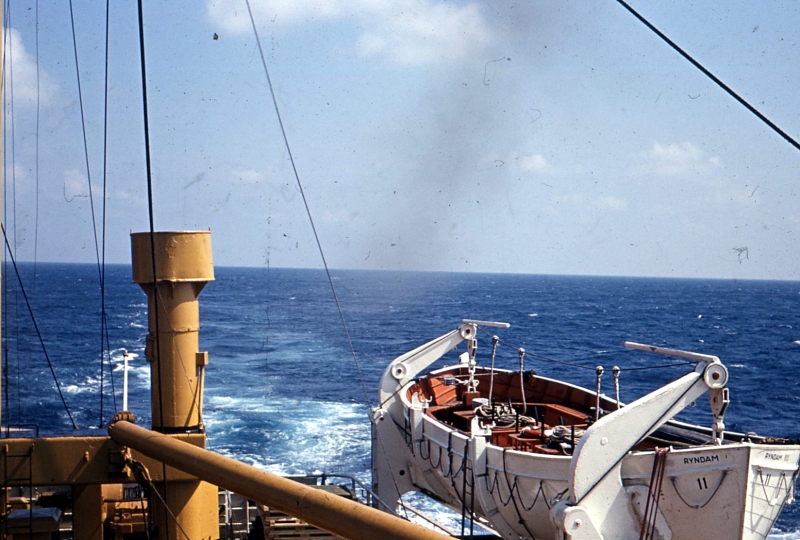
The Ryndam Approaching Canada
We had already set back our time on board by three hours, which meant that we had covered more than half of the total distance of our route to Canada. Like a giant magnet the approaching American continent channeled and directed my thoughts and feelings towards it as to make me feel at home before we even arrived at the port of entry. At Adolf’s portable radio, which he had bought on board at the duty-free shop, we picked up the first Canadian stations and eagerly listened to music and news from the island province of Newfoundland. Yet, in spite of my joyful anticipation of soon setting foot on my new homeland, there were also moments, when being alone in our cabin I began to examine in a critical manner my motives for leaving Germany.
For my brother Adolf the voyage was simply a return to where he belonged after the successful completion of his journeyman program as a machinist. My sister Erika, a fully trained and certified nurse, wanted to escape the deplorable working conditions in the German hospitals, where she was overworked and underpaid.
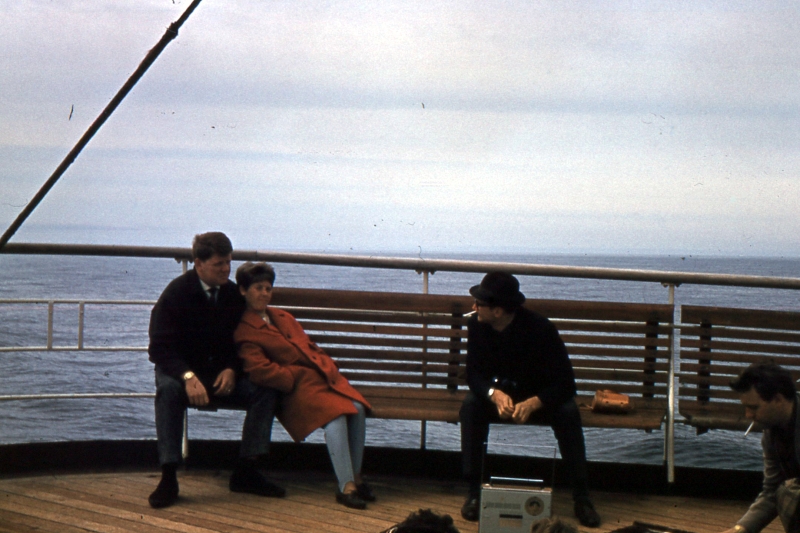
My Brother Adolf Chatting with a Butcher’s Couple
But what about me? Wasn’t I a fool to leave Germany, where I could have enrolled in any of the post-secondary programs leading to a diploma in my favourite field in high frequency technology? The words of the kind army major at the basic training camp were still ringing in my ears and entered my thoughts about a great opportunity I may have missed. He had urged me to consider a career in teaching at the technical army schools as a high-ranking and well-paid officer. I could have also gone into teaching with excellent prospects in Germany. Seeing all these real opportunities I realized the painful irony of my situation. Even though I had never met Biene’s parents except for a brief encounter at the Baldeney campground, I was unknowingly sharing their conservative – we would say old-fashioned today – expectations for their future son-in-law. I felt like they did that to be acceptable to marry their daughter I would have to be able to support her. To achieve this goal, I needed a minimum of six years at a German university in order to become a high school teacher or an engineer in electronics. At the time of my immigration to Canada, there existed a two-years teachers’ training program. This would have been a crash course, which upon successful completion allowed the student to go out and teach as long as he or she was willing to put in the extra course work in summer sessions to complete the diploma requirements. So the main reason for me to emigrate was not to seek better jobs, to enjoy a greater sense of freedom, or to experience the grandeur of the Canadian wilderness, albeit very appealing in and of themselves, but that it was a means to an end, i.e. to get married to Biene as soon as possible. It was truly paradoxical that in order to be close to Biene in the future, I had to be far away from her, At this point in time we couldn’t even dream of meeting in the next couple of years.
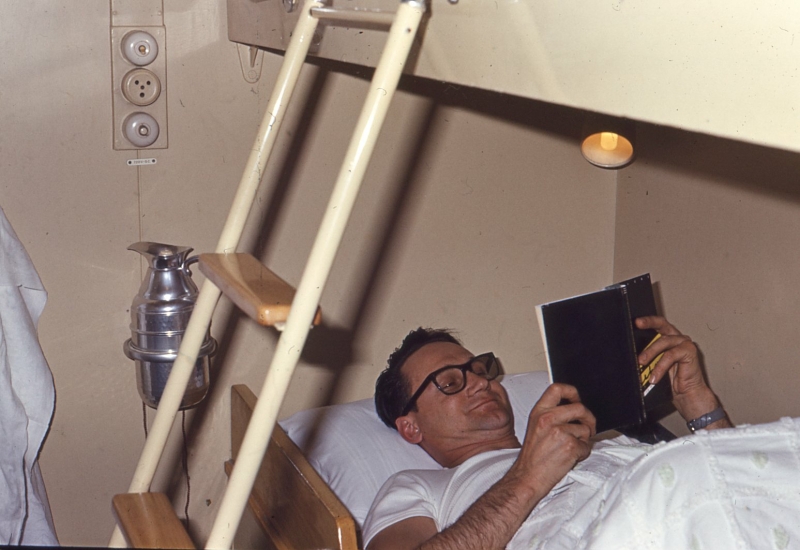
Adolf in his Tiny, but Cozy Bunk
It is a strange thing about love. We feel its power, yet we cannot describe it. It has no physical location, even though we assert we feel it in our hearts. It has no substance, yet we say metaphorically love is in the air. However, we know it exists whenever we are in it and feel its tug at our heartstrings. We begin to see things associated with our beloved that we did not see before. So it was the case with Biene and me. I was on my way to Canada. All of a sudden this relatively unknown country from a German perspective had taken on an entirely new meaning for Biene. If love had not established a connection to this alluring country across the Atlantic, she would not have cared much about it, when her sister Elsbeth in Gotha romanticized about Canada and the wonderful things she had seen on TV. But now the floodgate of associations was wide open. Anything that had even remotely to do with Canada filled her heart with joyous anticipation. Somehow its name had taken on an auspicious meaning for her. She bought travel books on this second largest country in the world. Soon she described herself tongue-in-cheek as an expert on Canadian affairs. Whenever something related to this country came up on the radio, she perked up and eagerly listened to the news. On her daily trip to the teacher’s college in Wuppertal she walked by a large clock that indicated also the times in many other locations in the world. Of course, she would be interested in knowing the time in Calgary, where I would soon arrive by car with Adolf. When a seminar with slide presentation on travels in North America was offered to the general public at a community college, Biene attended the session. The presenter Martin Winter had traveled across all the Americas. He showed his slides of the Canadian wilderness, the majestic Rocky Mountains, serene lakes and raging rivers. When he talked about Calgary and the Stampede, the greatest rodeo spectacle on earth, Biene was so thrilled, she went to see him after the presentation and told him that her fiancé was just then on his way to Canada. ‘One day’, she wrote me in her enthusiasm for this wild and beautiful country, ‘you must take me camping to one of these glorious mountain lakes.’
Arriving in Canada in our Sleep

Iceberg – Photo Credit: icebergwatereurope.com
In the meantime on board of the Ryndam we could tell that we were approaching Canada’s territorial waters. The storm that had been stirring up the ocean moved on eastward and made room for sunny sky and calm conditions. The temperature plunged to 2° C. On deck we had to wrap ourselves in woolen blankets to enjoy a short sunbathing session in the cold air. The Ryndam seemed to have reduced her speed although there were hardly any waves. Suddenly we heard a message over the intercom speakers to alert us to an iceberg that was floating by less than one km to the right. As we were coming closer, we marvelled at the beauty of the mountainous object that glittered in the bright sunshine like a diamond of gigantic size. Knowing that ninety percent of an iceberg is submerged and invisibly spreads into all directions, we now understood why the captain had decided on a slower pace. Fifty-five years ago about the same time and in the same waters a single iceberg had sent the ‘unsinkable’ Titanic in less than three hours to the bottom of the sea.

The First Seagulls
The next morning three fishing vessels were slowly passing by on starboard, a sure sign that we were not far from land. Seagulls suddenly appeared as if from nowhere and trailed our ship at the stern expecting to find scraps of food that someone might have thrown overboard. Then the first offshore islands emerged from the hazy horizon. They looked desolate and uninhabited. They were all covered in snow. The icebergs, the snow on the islands and the chill in the air made us feel that spring had not yet come in this part of Canada.

The First Off-Shore Islands
My sister suffered from a sore throat and decided not to accompany us in the car to travel across the continent, but to take the train instead. In the evening Adolf and I went into the bar that was more crowded than usual to say good-bye to our friends and table companions. At three in the morning, I am not sure after how many shots of whiskey and how many glasses of beer, we were finally done with saying our good-byes. After getting only a few winks of sleep, we awoke this time not by the familiar tinkling of the breakfast bell, but by an eerie quietness. Still groggy from all the partying the night before we however managed to jump into our clothes at lightning speed and rushed on board. We were anxious to find out what kind of calamity the Ryndam had gotten itself into. Perhaps the engines had broken down. Or did those dreadful icebergs surround us? What a pleasant surprise was unfolding before our eyes! The Ryndam peacefully lay securely tied to the pier posts at the Quebec Harbor. What a shame! While sleeping we had arrived in Canada.

Quebec Harbor – May 1965
After breakfast Erika and I with all the other immigrants walked over the gangway past large cargo and shipping facilities to the federal office building. There a friendly bilingual customs and immigration official greeted us and carefully examined our passports and the flimsy unassuming piece of paper we had received from the Canadian embassy in Cologne. The terrorists of today would be laughing at the simple document of fifty years ago. A photocopy on ordinary paper would have sufficed to let them slip by our border checkpoints. While we were waiting to get our documents stamped and approved, a charitable organization offered us our first cup of coffee on Canadian soil. It turned out to be a typical brew as offered then in most American coffee shops, so weak and bland you could be drinking it all day without any adverse effect, as some people were in the habit of doing. A Catholic priest asked us about our plans and provided us with useful information on Alberta, British Columbia and the other provinces of Canada. Then quite relieved that we had successfully jumped the first hurdle and had officially become a member of the Canadian society with all its rights and responsibilities except for the right to vote, we returned to our ship to reconnect with Adolf. The French-Canadian officials at the pier smiled, when I played the German folk song ‘Muss i denn, muss i denn zum Städtele hinaus’ on the harmonica. Elvis Presley sang this lovely tune while with the American Armed Forces in Germany. Wooden Heart was its English title. The sentimental Germans who themselves were beginning to forget and to neglect their very own folk songs liked the Elvis version so much that the song maintained the number one position on the German record charts for several weeks in a row.
First Impressions

Picturesque Quebec City – May 1965
Now we were at liberty to visit Quebec City. Adolf, who as Canadian citizen did not have to go through the immigration procedure, joined us to explore the only walled city in all of North America. We took a taxi to the city centre. We traveled past wooden houses painted in bright, sometimes garish-looking colors offering a bewildering sight for the new immigrants from the Old Country. When my sister and I noticed the ugly power poles often leaning at a precarious angle in the back alleys with wires seemingly helter-skelter stretching out in all directions, we broke out in irreverent fits of laughter. Adolf was quite annoyed, as we had touched a sensitive nerve. After all it was his home country that we were insulting with our disrespectful conduct.
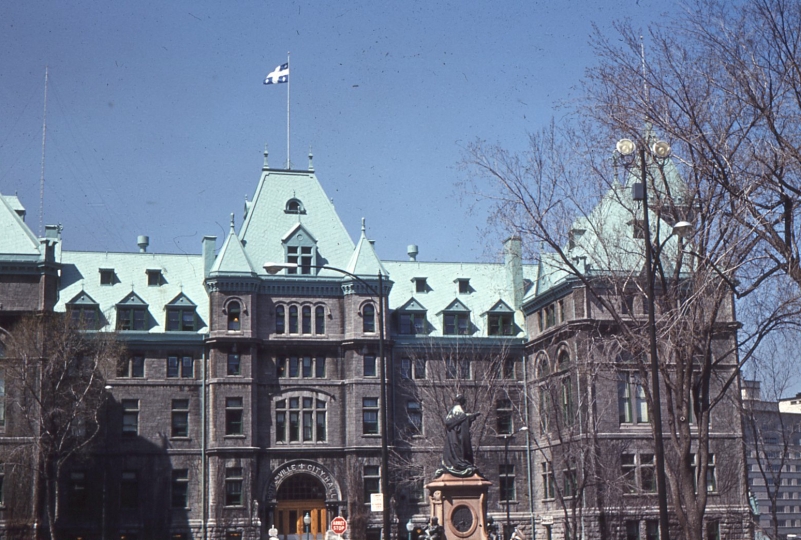
City Hall Quebec City
We got out of the taxi at the statue of Samuel de Champlain, the French explorer, founder and first governor of Quebec. There Adolf and I decided to separate from Erika and her companion Beate, as they were more interested in shopping. We two brothers, however, wanted to have a good look at the ramparts and fortifications of this historically rich city. So we took a tour of the classical 17th century defense systems with its mighty walls, which unfortunately in the end did not prevent the British redcoats from taking over all the French colonial possessions in North America.

Samuel Champlain – French Explorer and First Governor of Quebec
When hunger pangs reminded us that it was time to have lunch, we dropped in at one of the many restaurants catering to the tourists that were flocking to Quebec City by the tens of thousands every year. We ordered steaks, large enough to fill out the entire plate and at $2.00 a bargain even at the then current dismal German Canadian currency exchange rate of four marks to one dollar. I had trouble communicating with the waiter with my Parisian school French. So I could not figure out, why they could not serve us any beer, which would have complemented nicely the fabulous meat dish. To quench our thirst, it felt odd that we had to move on in search of a beer parlor. To call it a pub would have definitely been a misnomer. The place was filled with dense cigarette smoke wafting above oversized round tables, the jabbering of hundreds of people echoing from the bare walls gave more the impression of a large waiting hall at a German railroad station than that of a cozy inn, like the one where Biene and I had spent a romantic afternoon on Mount Vogelsberg. These beer parlors had been built based on the mistaken belief that their grotesque ugliness would deter people from gathering and drinking beer. Great was my amazement to watch the clients order half a dozen glasses of beer all at once, not caring about their drink getting stale. Some even sprinkled salt on their brew or ate heavily salted peanuts to increase their thirst for more. Adolf was quite used to this custom, which seemed to me a relic of the past. It was a bit of a culture shock to me and I was happy when we returned to the Ryndam, where we enjoyed the sumptuous farewell dinner that the cooks had prepared for us, truly a culinary experience par excellence.

Cannons and Fortifications – My Brother Adolf on the Left
There were many last times on this floating hotel and entertainment centre that had safely carried us across the Atlantic, the last dinner with our table companions, the last game of chess with a Yugoslav doctor, the last card game of Mau Mau, the last visit to the bar, the last time I climbed up to my upper bunk, a last glance from above on Biene’s portrait on the cabin’s tiny desk, the last time the little room bell tinkled and called us for the last breakfast on board of the Ryndam. My heart filled with a sense of nostalgia and bittersweet feelings of regret. I had to leave this wonderful ship with her dedicated staff behind. I felt sad that I had not been able to share all these memorable experiences of the eight days on board with Biene.
Was border crossing (into the Dutch territory) easy for Germans on board a train? Looking at all those picture one gets transported into a different world. I enjoyed all these colored pictures. Did you click all these pictures? I assume you must have clicked a lot more
LikeLiked by 2 people
The EU was still a long way off, but border crossing in those days with proper identification was a snap.
Yes, I took all the pictures you see in this post and all the subsequent posts. It is only a small selection of our journey. Thanks for the insightful comment, Arv!
LikeLiked by 1 person
Great! 🙂
LikeLiked by 1 person
What a wonderful, and well-told, story, Peter. Were most of the other passengers on the ship emigrating to Canada?
LikeLiked by 1 person
Indeed, but the times of European immigrants were coming to an end. The Holland-America Line took mostly care of immigrants to Canada and the USA at that time. Thanks for stopping by!
LikeLiked by 1 person
What an adventure! Your mother must have been so sad that three of her children were moving so far away. I can’t imagine it. But for you and your siblings—how exciting it must have been. And you’ve beautifully conveyed your own ambivalence about leaving Biene behind. Can you explain why moving to Canada allowed you to be together faster than if you’d stayed in Germany?
I love the Shakespeare quote—which play is it from? Or is it a sonnet?
LikeLiked by 1 person
It was sad for my mother, but she was able to visit us very often in Canada. While she was still alive, we also went see her in Germany. The last time was to celebrate her 95th birthday.
The quote is from Julius Caesar Act 4, scene 3, 218–224 and was quite fitting as it also describes the voyage of Biene’s and my journey to become a married couple. Thank you so much for your heartfelt comment, Amy!
LikeLiked by 1 person
Thanks, Peter. It’s wonderful that your mother lived such a long life and that she was able to see her children both in Canada and Germany.
LikeLiked by 1 person
My wife and I were already at the Frankfurt Airport boarding the plane to Canada when my mother passed away after seeing one last time her entire family.
LikeLiked by 1 person
Oh, how hard that must have been. I am so sorry.
LikeLiked by 1 person
Peter. it was so good that you and two of your siblings could travel to Canada together. What a send-off you all had. Taking a ship must have made the transition easier. You were definitely on a big adventure!
LikeLiked by 2 people
Yes, you are right, Hazel, going with my brother and sister made everything much easier.
LikeLiked by 1 person
the last game of chess with a Yugoslav doctor…how did it go?
When I look at your pictures of Quebec: I was once there around 93, for one single day, but hardly can remember a thing.
LikeLiked by 1 person
I was a very inexperienced chess player at the time of my game with the Yugoslav doctor. He had me beaten in no time. I felt like receiving an honour to be able to play with him.
As to my memory about Quebec, I wrote a journal during our voyage. Together with the photos many of these experiences were coming back quite vividly.
LikeLiked by 1 person
What an interesting crossing to your new home! Personally, the storm would have scared me more than the ice berg, although I know both can be dangerous. I think it would have been wonderful if Biene could have made this trip with you, but I know the time was not right. Thanks for sharing this, Peter!
LikeLiked by 1 person
It seems to me, when you are young, you tend to be more daring. Today I would not go out into a storm like that.
LikeLiked by 1 person
What an adventure! Such a wonderful story you are passing down to your family ❤
LikeLiked by 1 person
Thank you, Jodi! It was indeed a great adventure to come to Canada by boat rather than by plane.
LikeLiked by 1 person
Hi Peter, I smiled when I read about Biene’s growing interest in Canada, having married a Canadian who still loves all things “Canada”. She became a proud naturalized U.S. Citizen when my kids were small, but will always be a Canadian at heart and still takes every opportunity to meet and chat with fellow Canadians she runs into here in the States.
I’m always amazed at how much you remember about your younger days, and especially this voyage in particular, I’m sure the photos help trigger memories, and of course, the letters and the Book of Dreams. I also see that you kept a travelogue and I wonder if you still have it? The details you provide really help to make this fun reading. Thanks Peter, great story and photos!
LikeLiked by 1 person
Without the travelogue and the photos I would not have been able to remember so many details. Oh yes, I still have the journal and also Biene’s book of dreams. Thank you so much for your kind comment, Des!
LikeLiked by 1 person
Diese ganze Aufregung , bis die Reise losgehen konnte. So etwas kann man nur in jungen Jahren und mit ganz viel Optimismus überstehen..😉😁 Ich hätte z.B. zu gerne mitgehört, was für “Liebenswürdigkeiten ” Ihr Geschwister Euch so an den Kopf geworfen habt wegen der Kisten und so, die Ihr selber zum Schiff bringen mußtet…😁 Und Jürgen war der rettende Engel, wie übrigens so oft in seinem Leben..Das haben die Keglers wohl so an sich..
Und dann noch das ganze Abschiednehmen… Und auch noch das/ die Liebste nicht mitnehmen können…Was für tröstende Worte und Überraschungen Ihr Euch aber auch immer habt einfallen..das zu lesen und zu hören ist toll.
Ausgehend von Deinem Zitat,hab ich mal kurz bei Shakespeare reingesehen und auch einen Spruch gelesen:”Die Reise ist zu Ende, wenn zwei Liebende sich sich finden”..(so ähnlich jedenfalls..)
Eure Reise hat echt lange gedauert..Oder?? 👍
Wir wünschen Euch eine schöne, harmonische Weihnachtszeit!
Euer Weihnachtsbaum steht ja schon, wie Du geschrieben hast..👋👋👋
Herzliche Grüße!
LikeLiked by 1 person
Als Biene meinen Baum nicht so gerne mochte und auch Stefan protestierte, dass wir ihm die größte Freude genommen haben, haben wir den Baum wieder weggeschafft. Wenn Stefan nächsten Mittwoch über den Pass fährt, wird er wieder einen mitbringen.
Ich habe Dieters Reisepläne schon gelesen. Ich glaube, eure Reise wird euch viel Freude bereiten. Liebe Grüße! Peter
LikeLike
Was für eine wunderschöne Idee mit der Schallplatte, Peter! Es ist so tröstlich, die Stimme des Geliebten zu hören! Ich habe manchmal meinen Mann angerufen, obwohl ich wusste, dass er geschäftlich unterwegs war, nur um seine Stimme auf dem Anrufbeantworter zu hören … 😉 😀 (Das war bevor wir heirateten …)
Bei Sturm hätte ich mich auch nicht an Deck getraut. Ich werde seekrank. Als wir von der ersten Schottlandreise zurückkamen, hatten wir Windstärke 10 auf dem Ärmelkanal, was habe ich gelitten … 😀
LikeLiked by 1 person
Ja, Biene hatte sich riesig über das Abschiedsgeschenk gefreut.
Unser Schiff war bestimmt viel größer und schaukelte nicht so sehr im Sturm. Ich war nur ein bisschen seekrank. Viele liebe Grüße! Peter
LikeLiked by 1 person
Amazing story. Crossing the Atlantic on a ship sound very exciting. I only know one person who did a cross-continent ship travel, sometime in the late fifties when one of my grandfather’s younger brothers went all the way to England to study. Apparently many of the family elders travelled a thousand miles to Bombay to see him off.
LikeLiked by 1 person
How difficult it was in those days to travel! Nowadays, we hop on a plane and we are at our destination within less than a day.
LikeLiked by 1 person
What a beautifully told and enjoyable story! I particularly enjoyed your musings about love and the many contemporaneous pictures really brought the story to life for me. Thank you for sharing, Peter!
LikeLiked by 1 person
Thank you, dear Tiny! Your comment gave me a big boost for blogging in 2019. Happy New Year!
LikeLiked by 1 person